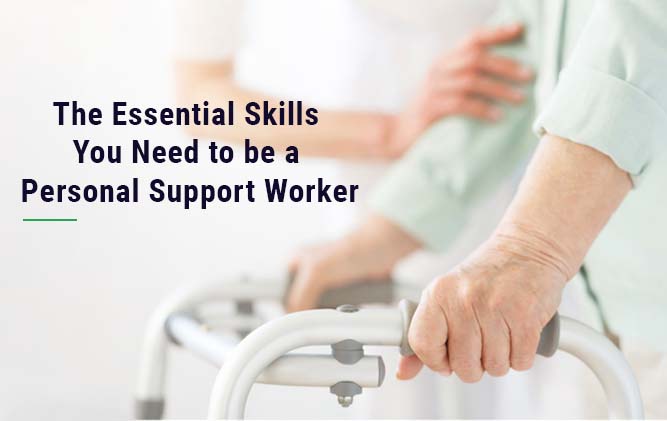When it comes to a career as a personal support worker (PSW), there is so much more to consider than just your education. As with any job or industry where you’ll be interacting with and caring for other people, there are many essential skills that you need to have in your arsenal to set yourself up for success. If you’ve chosen this as your career, it’s likely that you already have good interpersonal and communication skills, but there’s of course so much more to it than that!
No need to worry though – we’ve got you covered! In this post, we’ll walk you through the professional skills you’ll need to master, as well as the personal skills needed to be successful. Some of the personal skills are things you can learn and develop over time, especially as you gain more experience and work with different patients. If you are determined to have a fulfilling career, there are many variables and skill sets that employers look for in a personal support worker.
First things first, we want to outline what exactly is a personal support worker:
A Personal Support Worker (PSW) provides essential care and services to those who require assistance in their day-to-day activities. A PSW can be employed publicly or privately, working in hospitals, long-term care facilities, supportive housing, educational facilities, adult group homes, nursing homes, or assisting patients in their own homes.
Based on where they are employed, a PSW’s responsibilities can vary. Some tasks a PSW may be required to complete include:
- Assisting medical professionals with patient care
- Helping patients feed themselves or with personal hygiene care
- Administering medications
- Developing and implementing care plans that cater to specific patients’ needs
- Performing minor housekeeping tasks
Check out our latest blog “How to Become a PSW in Ontario” to learn more about what a PSW job entails and how to begin the process for starting your career.

Professional Skills vs. Personal Skills as a PSW
In a role like a personal support worker, where you’ll be working one-on-one with individuals to provide medical, emotional, and daily support, there will be a lot of overlap between the personal and professional skills you use.
We’ll break these down in the following way:
- Professional skills: those that you will learn in school, and are linked to actions or activities that you will be performing.
- Personal skills: relate to your demeanour, relationships, and will be beneficial when acting on your professional activities.
First up, let’s cover the professional side, which you’ll need a bit more instruction and specialized practice to master!
Professional Skills You Need As a PSW
1. Assisting with Essential Living
As we mentioned, professional skills are those that are specific to a personal support worker and their role. These are the things that you will likely learn during your training program and are related to concrete activities that you will perform over the course of your career.
That said, some of these are also skills you’ve likely learned over your own life, such as how to do dishes, laundry, grocery shop, drive a car, etc. Some of your patients will need assistance with these tasks to help improve their quality of life, and knowing these essentials will help you on the job often.
2. Medical Care
You’ll also need to learn many medical-professional skills, especially for patients who are chronically ill or in palliative care. These can include how to administer medications, dressing changes, and ensuring proper monitoring and recording for their medical team.
While there will likely also be a nurse on hand or visiting in some cases, you will still need training in these areas for non-invasive and/or non-sterile medical care. Additionally, you’ll want to be trained in CPR, and how to safely lift and move low mobility patients.
Proper hygiene care will also be essential, especially for bed-ridden or low mobility patients, who may not be able to perform those tasks themselves, and can have implications for their overall health if not done properly.
3. Emotional Support
As a personal support worker, you’ll also need to be trained in specific social support topics in order to provide the right level of care for both your patients and their families. Such topics include abuse and neglect, care for the dying, family assistance, and care for cognitive and mental health concerns. You should be well versed in how to navigate different interpersonal situations and in treating different conditions, especially chronic or cognitive conditions as part of your PSW professional skill set.
Aside from these professional skills, which will be covered in your PSW training course, there are also several essential personal or soft skills that you will develop over time and will help you provide the best possible level of care for your patients that goes beyond medications, grocery shopping, and hygiene.

Personal Skills You Need As a PSW
1. Communication
Along with training in certain social support roles, you’ll also need to develop strong interpersonal skills to be an effective personal support worker. One of the key skills in your arsenal will be communication- between you and your patient, you and their family, and you and their medical team. You should also be skilled in facilitating communication between all of these parties, and be ready to advocate for your patient when necessary. You will be managing several different relationships, and keeping open communication between each will be vital to providing the best patient care and ensuring everyone is on the same page.
2. Empathy & Compassion
It goes without saying that empathy and compassion are key for any patient relationship and should be a part of every interaction that you have. That said, you also need to know when to be pragmatic and how to balance that with being compassionate to each situation and your patient’s concerns. This also applies to dealing with families as well.
3. Problem Solving
Problem-solving, the ability to work on your own and as part of a team, the ability to compartmentalize, and work in stressful situations can all be additional skills of some benefit to you as a personal support worker. Flexibility is also key to managing multiple patients and changing situations as their conditions or other external factors change.
Ultimately, these are skills you will develop over time and continually improve upon, and should be mindful of in every interaction. That said, Cestar College can help you develop these, alongside your professional skills, in a real-world setting.
Hard & Soft Skills Needed as a PSW
Continuing with these professional skills and personal skills, there are a set of hard skills which include the technical knowledge capabilities you need to perform this job safely. These hard skills include:
- Knowledge of body systems
- Knowledge of common physical health conditions
- Knowledge of common cognitive problems and mental health
- Proper techniques in assisting with personal hygiene
- Best practices in nutrition and assisting with medication
- Safely operating mobility machinery/devices
- Proper documentation
In addition to your personal skills, there are even more ‘soft’ skills that can be beneficial to apply as a personal support worker. Soft skills relate more to your insights, motivations, feelings, and emotions. These skills allow you to add “human touch” to communicate effectively with your clients, employers, and colleagues. Soft skills also allow you to manage yourself well and stand out as an excellent personal support worker. Most PSW interview questions will be focused on your soft skills.
We touched on a couple in the previous section, but here a couple more to consider:
- Time management and organization
- Teamwork
- Positive outlook and uplifting attitude
- Keen observation and critical thinking
Check out our previous blog to learn more about the “Top Hard & Soft Skills You Need as a PSW.”
Develop your Skills with Cestar
At Cestar, we focus on ensuring you have all the requisite skills and training to complete your NAAC examination at the end of your personal support worker course. We cover all the professional skills listed above, and more, so that you have the knowledge and capabilities to work in different settings with different patients, and still maintain the same excellent standard of care.
Through your placement hours, both in facilities and in the community, you’ll be able to practice these professional skills while also getting to develop your personal skills alongside, and understand how these come together in your career as a personal support worker. After 7 months in Cestar’s NAAC Personal Support Worker Training program, you’ll be ready to enter the workforce with all the accreditation and skills employers are looking for.
Contact us today to learn more about the program, admissions, and financial aid!
About Cestar College’s PSW Program
By applying to Cestar College’s Personal Support Worker (PSW) program, you’re choosing:
- One of the most comprehensive Personal Support Worker curriculums in Ontario, covering all aspects of healthcare available to PSW graduates.
- 700 hours of learning, including 200 hours of Clinical Placement and 110 hours of Facility Placement, giving you the benefits of real-life work experience while still in school.
- A campus conveniently located in Toronto, providing students with access to every amenity possible.
- Small class sizes that foster discussion-based education and provide a welcoming learning environment for all students.
- Dedicated instructors with years of experience who take pride in seeing their students succeed.
- A challenging but rewarding learning experience full of support from all Cestar College faculty and administrators.
For more information about our program, visit our program page today!
Have any questions for us?
Please feel free to contact us. One of our representatives will be happy to assist you!


